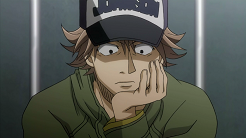Episode 17 continued to spin the saga of the three ETU forwards, Sera, Sakai and Natsuki. The nice thing about this has been that none of them are bad guys – just competitors who want to play. Sera has been the one at the center of the narrative and thus thus the most sympathetic, but all of them have had their moments.
The episode begins (after the usual extended recap footage) with Sera having been diagnosed with a sprained ankle, and out for a week. Not a big deal – but Sera knows that its a critical time, and mopes while watching the junior team scrimmage and eating potato chips. That’s when Sakai gets his first extended time to shine. He reveals that he’s old (31) and past his prime, and his resentment that Sera can mope around eating junk food just because he’s young. Sakai doesn’t feel he should have lost his job to Sera, never mind Natsu – and in his harsh way he encourages Sera not to give up the fight either. For Sera, though inspired by Sakai’s samurai spirit, it’s agony to watch ETU play without him – he wants them to win, but not look too good in his absence.
Of course his agony only gets worse when Natsu subs in for Sakai as striker – and ETU promptly surrenders a goal on a counterattack. However, the tables soon turn – Natsu scores a goal on a burst of brilliant creativity and ETU scrapes together a draw. The Edomae have grown to five, the players seem elated, but Murakoshi scolds them for celebrating a draw, and Tatsumi looks worried – clearly not satisfied with their progress.
I loved several moments of this episode, most especially Tatsumi’s exasperated “Why can’t he be normal?” when Natsu was engaged in his bizarre on-field antics. Natsu could easily be the villain here, but he’s not – he has a wife and (incredibly goofy-looking) daughter he loves, and just wants to play and score goals. He’s a simple guy, but obviously extremely talented. Sakai is classic conventional forward, by his own admission not as fast as Sera or strong as Natsuki, but smart and strong in the air. He sees his best days are behind him and desperately wants to hang on for as long as he can. And then there’s Sera, young and fast and full of self-doubt, who sees that Natsumi brings elements to the game that he never will. You want all of them to play, which is a tribute to the writing here – but only one of them can be a starter, and Natsu is clearly that guy. I’ll be very interested to see how this is finessed as we progress into the last arcs of the adaptation.




